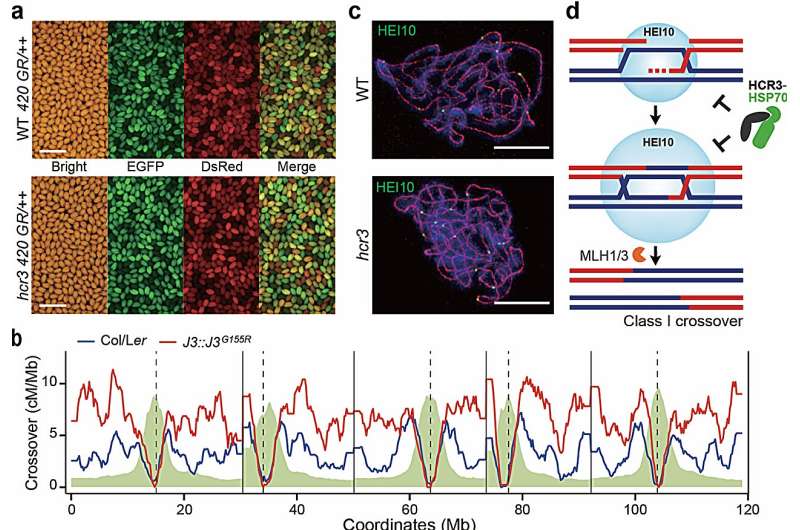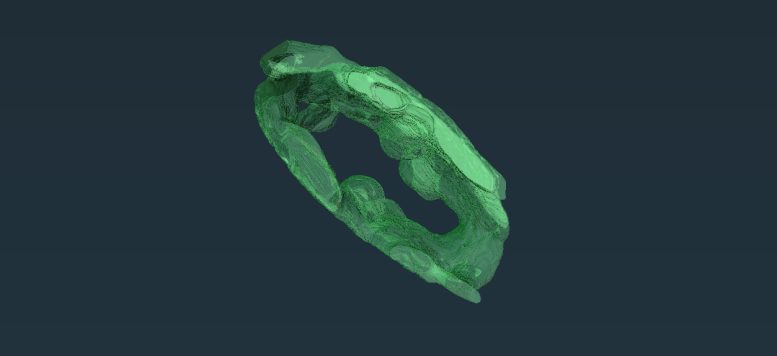https://phys.org/news/2024-03-mutation- ... iosis.htmlMARCH 8, 2024
A high-throughput genetic screening of meiotic crossover rate mutants in Arabidopsis thaliana has unraveled a century-old mystery in the life sciences.
A research team, consisting of Professor Kyuha Choi, Dr. Jaeil Kim, and Ph.D. candidate Heejin Kim from the Department of Life Sciences at Pohang University of Science and Technology (POSTECH), has unveiled the molecular mechanism responsible for crossover interference during meiosis, a biological pattern at the chromosome level.
The findings of this research were published on February 20 in Nature Plants.
In sexually reproducing organisms, individuals resemble their parents or siblings. Despite the striking similarities, it's crucial to recognize that absolute identicalness is unattainable. This variation is attributed to the process of meiosis, which generates reproductive cells like sperm and eggs in animals or pollen and ovules in plants. Unlike somatic cell division, which duplicates and divides the genome identically, meiosis creates genetically diverse reproductive cells through a mechanism known as crossover.
Meiosis and crossover play pivotal roles in biodiversity and have significant implications in breeding where the selection and cultivation of superior traits in crops occur.
Biology & Medicine News and Discussions
- Time_Traveller
- Posts: 2234
- Joined: Sun May 16, 2021 4:49 pm
- Location: San Francisco, USA, June 7th 1929 C.E
Re: Biology & Medicine News and Discussions
Mutation solves a century-old mystery in meiosis
"We all have our time machines, don't we. Those that take us back are memories...And those that carry us forward, are dreams."
-H.G Wells.
-H.G Wells.
-
weatheriscool
- Posts: 13586
- Joined: Sun May 16, 2021 6:16 pm
Re: Biology & Medicine News and Discussions
Researchers develop artificial building blocks of life
https://phys.org/news/2024-03-artificia ... -life.html
by Anna Euteneuer, University of Cologne
https://phys.org/news/2024-03-artificia ... -life.html
by Anna Euteneuer, University of Cologne
For the first time, scientists from the University of Cologne (UoC) have developed artificial nucleotides, the building blocks of DNA, with several additional properties in the laboratory, which could be used as artificial nucleic acids for therapeutic applications.
DNA carries the genetic information of all living organisms and consists of only four different building blocks, the nucleotides. Nucleotides are composed of three distinctive parts: a sugar molecule, a phosphate group, and one of the four nucleobases adenine, thymine, guanine, and cytosine.
The nucleotides are lined up millions of times and form the DNA double helix, similar to a spiral staircase. Scientists from the UoC's Department of Chemistry have now shown that the structure of nucleotides can be modified to a great extent in the laboratory. The researchers developed so-called threofuranosyl nucleic acid (TNA) with a new, additional base pair.
- Time_Traveller
- Posts: 2234
- Joined: Sun May 16, 2021 4:49 pm
- Location: San Francisco, USA, June 7th 1929 C.E
Re: Biology & Medicine News and Discussions
Scientists Unravel the Unusual Cell Biology Behind Toxic Algal Blooms
MARCH 12, 2024
MARCH 12, 2024
https://scitechdaily.com/scientists-unr ... al-blooms/
A distinctive photosynthetic machinery characterizes a unicellular organism present in algal blooms.
What are the cellular mechanisms within a single-celled marine algae species responsible for triggering toxic algal blooms? A research group under the direction of microbiologist Prof. Dr. Ralf Rabus from the University of Oldenburg, Germany, has conducted first detailed analyses of the unusual cell biology of Prorocentrum cordatum, a globally widespread species of the dinoflagellates group, using both advanced microscopic and proteomics approaches.
As the team reports in the science journal Plant Physiology, the photosynthesis process in these microorganisms is organised in an unusual configuration which may help them to better adapt to the changing light conditions in the oceans. The results of the study could lead to an improved understanding of the incidence of harmful algal blooms, which may be becoming more frequent due to climate change.
Dinoflagellates are important organisms in both marine and freshwater ecosystems. These unicellular organisms make up a substantial proportion of free-living phytoplankton, which forms the basis of the food web in oceans and lakes. Some species, including Prorocentrum cordatum, can proliferate in warm, nutrient-rich waters and form harmful algal blooms.
“We studied this organism because despite its environmental relevance its cell biology and metabolic physiology are still poorly understood,” said Rabus. In addition to studying photosynthesis in the microalgae, the researchers also examined the structure of their cell nuclei and their response to heat stress in collaboration with teams from the Universities of Hanover, Braunschweig, and Munich and set out the findings in two other recently published papers.
"We all have our time machines, don't we. Those that take us back are memories...And those that carry us forward, are dreams."
-H.G Wells.
-H.G Wells.
-
weatheriscool
- Posts: 13586
- Joined: Sun May 16, 2021 6:16 pm
Re: Biology & Medicine News and Discussions
Point-of-care therapeutics sensor could make automated dosing systems universal
https://medicalxpress.com/news/2024-03- ... ersal.html
by Jade Boyd, Rice University
https://medicalxpress.com/news/2024-03- ... ersal.html
by Jade Boyd, Rice University
Rice University synthetic biologists have found a way to piggyback on the glucose monitoring technology used in automated insulin dosing systems and make it universally applicable for the monitoring and dosing of virtually any drug.
In a study in Nature Communications, researchers in the lab of Caroline Ajo-Franklin demonstrated the technique by modifying a blood-glucose sensor to detect the anticancer drug afimoxifene, an estrogen inhibitor that patient's bodies also make after they take the chemotherapy tamoxifen.
By building on mature biosensing technology that's commercially available at most drug stores for under $20, Ajo-Franklin's team hopes to speed the development of automated dosing systems for chemotherapies and other drugs as well as other technologies for real-time monitoring of biomarkers in the blood.
-
firestar464
- Posts: 829
- Joined: Wed Oct 12, 2022 7:45 am
Re: Biology & Medicine News and Discussions
https://medicalxpress.com/news/2024-03- ... comes.html
Less is more: Research finds not placing a drain improves distal pancreatectomy outcomes
Less is more: Research finds not placing a drain improves distal pancreatectomy outcomes
-
weatheriscool
- Posts: 13586
- Joined: Sun May 16, 2021 6:16 pm
Re: Biology & Medicine News and Discussions
Cells harvested from urine may have diagnostic potential for kidney disease, find scientists
https://medicalxpress.com/news/2024-03- ... ntial.html
by Michael Addelman, University of Manchester
https://medicalxpress.com/news/2024-03- ... ntial.html
by Michael Addelman, University of Manchester
Genes expressed in human cells harvested from urine are remarkably similar to those of the kidney itself, suggesting they could be an important non-invasive source of information on the kidney.
The news offers hope that doctors may one day be able to investigate suspected kidney pathologies without carrying out invasive procedures such as biopsies, raising the tantalizing prospect of earlier and simpler disease detection.
The impact of late detection of kidney disease can be severe and can lead to serious— and sometimes life threatening— complications.
-
firestar464
- Posts: 829
- Joined: Wed Oct 12, 2022 7:45 am
Re: Biology & Medicine News and Discussions
https://www.msn.com/en-us/health/other/ ... r-AA1mUsJe
Could An Ancient African Psychedelic Help Heal Brain Damage?
Could An Ancient African Psychedelic Help Heal Brain Damage?
-
weatheriscool
- Posts: 13586
- Joined: Sun May 16, 2021 6:16 pm
Re: Biology & Medicine News and Discussions
Researchers roll out a more accurate way to estimate genetic risks of disease
https://medicalxpress.com/news/2024-03- ... sease.html
by Claire Hendershot, Broad Institute of MIT and Harvard
https://medicalxpress.com/news/2024-03- ... sease.html
by Claire Hendershot, Broad Institute of MIT and Harvard
Researchers have developed statistical tools called polygenic risk scores (PRSs) that can estimate individuals' risk for certain diseases with strong genetic components, such as heart disease or diabetes. However, the data on which PRSs are built is often limited in diversity and scope. As a result, PRSs are less accurate when applied to populations that differ demographically from the PRS training data.
A new scoring approach featured in Cell Genomics and developed by researchers at the Broad Institute of MIT and Harvard and Massachusetts General Hospital (MGH) uses a comprehensive approach to generate more accurate and informative PRSs.
Aptly named PRSmix due to its ability to "mix" all previously developed PRSs for a given trait, the approach generates scores that estimate a patient's genetic disease risk more accurately than PRSs generated from individual studies.
"A major challenge with PRSs is that they're derived in one population and then unleashed broadly with the assumption that the scores can be generalized," explained Pradeep Natarajan, the study's corresponding author. Natarajan is an associate member in Broad's Cardiovascular Disease Initiative and director of preventive cardiology at MGH. "The overall motivation for this work is to better identify individuals who are prematurely at high risk for heritable conditions."
-
weatheriscool
- Posts: 13586
- Joined: Sun May 16, 2021 6:16 pm
Re: Biology & Medicine News and Discussions
AI technology helps identify cerebral palsy in babies
https://medicalxpress.com/news/2024-03- ... abies.html
by Murdoch Children's Research Institute
https://medicalxpress.com/news/2024-03- ... abies.html
by Murdoch Children's Research Institute
Cutting-edge technology that analyzes clips of babies' movements can help speed up detection of cerebral palsy, according to a new study.
The research, led by Murdoch Children's Research Institute (MCRI) and published in PLOS Digital Health, found AI technology could accurately track the movements of babies through smartphone videos, submitted by parents. Abnormal or absent movements were successfully detected in 76% of cases, similar to an assessment by an experienced clinician.
For the study, 484 videos were examined involving 327 infants, aged between 12 and 18 weeks old. The videos, captured on the Baby Moves app, showed babies lying on their backs doing spontaneous movements.
-
weatheriscool
- Posts: 13586
- Joined: Sun May 16, 2021 6:16 pm
Re: Biology & Medicine News and Discussions
Surgeons Transplant Pig Kidney Into a Patient, a Medical Milestone
Source: The New York Times
Source: The New York Times
Read more: Surgeons Transplant Pig Kidney Into a Patient, https://www.nytimes.com/2024/03/21/heal ... roid-shareSurgeons in Boston have transplanted a kidney from a genetically engineered pig into an ailing 62-year-old man, the first procedure of its kind. If successful, the breakthrough offers hope to hundreds of thousands of Americans whose kidneys have failed.
So far, the signs are promising. The new kidney began producing urine shortly after the surgery last weekend and the patient's condition continues to improve, according to physicians at Massachusetts General Hospital, known as Mass General. He is already walking the halls of the hospital and may be discharged soon.
A new source of kidneys "could solve an intractable problem in the field -- the inadequate access of minority patients to kidney transplants," said Dr. Winfred Williams, associate chief of the nephrology division at Mass General and the patient's primary kidney doctor.
If kidneys from genetically modified animals can be transplanted on a large scale, dialysis "will become obsolete," said Dr. Leonardo V. Riella, medical director for kidney transplantation at Mass General. The hospital's parent organization, Mass General Brigham, developed the transplant program.

